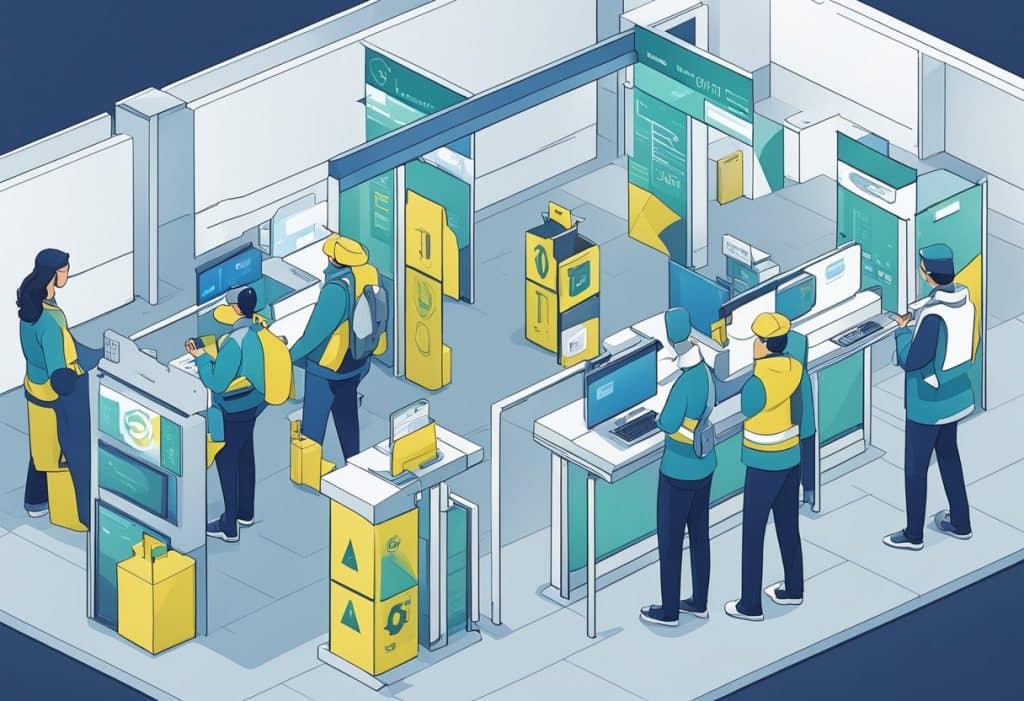Coinbase has become a well-known name in the digital currency space, offering a secure online platform for buying, selling, transferring, and storing cryptocurrencies. As part of its commitment to maintain a secure trading environment for its users, Coinbase implements a Know Your Customer (KYC) policy. KYC is a standard compliance procedure for financial institutions, aimed at getting to know the customers and preventing fraud by verifying the identity of individuals wishing to engage in financial transactions.

Understanding the KYC process is crucial for anyone looking to use Coinbase’s services. This process typically involves submitting various forms of identification and may include providing biometric data through the Coinbase app, available on both mobile and web platforms. With the growing concerns regarding security in the virtual asset market, Coinbase’s KYC measures are designed not only to comply with regulatory standards but also to ensure a high level of user protection against fraudulent activities.
Key Takeaways
- Coinbase implements KYC to secure trades and comply with regulations.
- The KYC process involves identity verification through documentation and biometric data.
- Coinbase’s KYC supports user protection on both mobile and web platforms.
Understanding KYC and Its Importance
Know Your Customer (KYC) is a regulatory framework pivotal to the financial industry, including digital asset platforms like Coinbase. This framework safeguards against illegal activities and is central to maintaining the integrity of financial transactions.
Know Your Customer (KYC) Laws
KYC laws are designed to ensure financial institutions accurately identify their customers. They are part of a larger set of anti-money laundering (AML) regulations aimed at curbing the misuse of financial systems.
| Aspect | Purpose of KYC Laws |
|---|---|
| Identity Verification | Confirm customer’s identity to maintain a legitimate customer base. |
| Risk Assessment | Gauge potential risks posed by customers to the institution. |
Regulatory Obligations
As a regulated entity, Coinbase must abide by local and international regulations. Your ability to use Coinbase’s full suite of services hinges on completing KYC verification processes which align with AML laws and help in maintaining a legal and transparent operation.
Key areas of focus for regulatory compliance on Coinbase:
- Identity validation and verification.
- Ongoing monitoring of customer transactions.
- Reporting suspicious activities to relevant authorities.
Fraudulent Activity Prevention
KYC policies play a crucial role in preventing fraudulent activities. By verifying identities, Coinbase can detect and deter activities like fraud and illicit fund transfers, ensuring a safer platform for your transactions.
Fraudulent activities targeted by KYC:
- Identity theft
- Financial fraud
- Money laundering
Data Privacy
While fulfilling KYC requirements, your personal information is collected and handled. Coinbase places significant emphasis on data privacy, ensuring that your personal details are securely stored and only used for compliance purposes.
Data privacy measures include:
- Secure data encryption
- Restricted access to personal information
- Regular audits and compliance checks
By understanding KYC and its importance, you are better equipped to appreciate the security measures that protect your interests within the financial ecosystem.
The Coinbase KYC Process
Coinbase adheres to strict Know Your Customer (KYC) protocols to ensure the security and legality of its services. As you navigate the Coinbase platform, you will encounter a mandatory KYC process designed to protect both the platform and its clientele.
Identity Verification Requirement
Your journey with Coinbase starts with identity verification, a legal requirement for all customers. Before accessing the full suite of Coinbase services, you must provide personal information that proves your identity. This step ensures compliance with anti-money laundering regulations and helps to prevent fraudulent activity on your account.
Multi-Step Verification Process
The verification on Coinbase is a detailed multi-step process. After submitting your personal information via the mobile app or website, Coinbase requires you to provide one of the following forms of government-issued photo ID:
- Passport
- National identity card
- Driver’s license
The information provided must be accurate and match the details you registered with. This multi-layered process verifies not only your identity but also enhances the security of your transactions.
Document Verification Steps
To complete the document verification, you will navigate to the Document Verification page within the Coinbase app or platform. There, you will follow these steps:
- Choose the type of identification card you wish to submit.
- Take a clear photo of the document, ensuring all information is visible.
- Upload the photo when prompted.
- Wait for the document to be processed and verified, which typically takes a few minutes.
Address Verification
In addition to identity verification, confirming your address is a critical step. You will be asked for a document that verifies your address, often a utility bill, bank statement, or similar record that includes your name and the provided address. This information further solidifies the authenticity of your profile and aids in building a transparent relationship with Coinbase.
These thorough verification steps conform to the KYC regulatory requirements and serve as your entry point to the secure and reliable trading environment Coinbase promises to its customers.
Required Documentation
When verifying your account on Coinbase, you’ll need to provide specific official documents to satisfy the Know Your Customer (KYC) regulatory requirements. Each document must be current, valid, and clearly legible, with all personal information up-to-date. The documents you provide should correspond to the country of your stated residence.
Accepted Identity Documents
For identity verification, you must submit one of the following documents, ensuring it is well-lit and fully visible:
- For users in the United States: A state-issued ID, driver’s license, United States permanent resident card (Green Card), or a United States passport.
- For users outside of the United States: An international passport, a national ID card, or a residence permit in accordance with the country’s accepted standards.
| Document Type | U.S. Residents | Non-U.S. Residents |
|---|---|---|
| Passport | ✅ | ✅ |
| Driver’s License | ✅ | Varies by country |
| State-Issued ID | ✅ | ❌ |
| Permanent Resident Card (Green Card) | ✅ | ❌ |
| Military IDs | ✅ With matching address | ❌ |
School IDs, medical IDs, temporary (paper) IDs, and public services cards are typically not acceptable forms of ID for the KYC process.
Proof of Residential Address
You will be asked to prove your residential address. Acceptable documents may include utility bills, bank statements, or other official documents that clearly show your name, residential address, and a recent date, typically within the last 3 months.
Additional Verification Documents
In some cases, Coinbase may request additional documentation or proof of your identity. This could include:
- A selfie video to confirm that you’re a real person and the owner of the submitted ID.
- Documents supporting your legal right to use the platform if you are a representative of a legal entity.
Providing precise personal information, including your full name and date of birth, is critical for the verification process. Make sure to use a supported browser to facilitate a smooth document upload process.
Coinbase Mobile and Web Platforms

Coinbase offers a user-friendly experience for identity verification across both its mobile and web platforms, ensuring compliance with KYC regulations and safeguarding against fraud.
Using the Mobile App
To verify your identity using the Coinbase mobile app, you need to have your government-issued ID ready. Your phone’s camera will be used to capture this information.
- Camera Usage: Utilize your phone’s camera to scan the ID ensuring the image is clear and all text is legible.
- Document Upload: The app prompts you to upload documents directly, avoiding complicated procedures.
Preparation Tips:
- Ensure a plain background to avoid glare or shadows.
- Follow the on-screen instructions carefully for a smoother process.
Using the Web Browser
For those opting to undergo KYC verification through a web browser, the recommended choice is Google Chrome due to its widespread compatibility and secure technology.
- Accessing Verification Page: Navigate to the dedicated Document Verification page on the Coinbase website.
- Document Submission: Upload scanned copies or clear photos of your required identity documents.
Recommendations:
- Check your browser’s compatibility in advance to avoid issues during the verification process.
- Make certain your document scans are clear with all information visible.
Device Comparison for KYC Verification
| Feature | Mobile App | Google Chrome Browser |
|---|---|---|
| Camera Integration | Direct, using phone’s camera | Requires separate scanner or camera |
| Ease of Document Upload | Generally more streamlined | Dependent on system setup |
| Recommended Environment | Good lighting, plain background | Stable internet, secure PC |
| Accessibility | On the go verification | At home or office preferred |
Security Measures

Coinbase implements stringent security measures to ensure your account’s safety and compliance with regulatory requirements.
Enhanced Security Protocols
Your security is strengthened through a multi-step verification process. This includes document verification steps that are essential for establishing and confirming your identity. Utilizing the document verification page, you are required to submit a government-issued photo ID, which can be a passport, driver’s license, or other identification documents. Additionally, a selfie (photo of your face) is often required to match you with your provided ID, bolstering security and deterring fraudulent activity.
Protecting Personal Information
Coinbase’s KYC procedures ensure that necessary information is collected to safeguard your personal details. The platform employs encryption and secure storage methods to protect your data from unauthorized access. During the verification process, only essential details are requested, keeping your public and private information separate and secure.
Account Recovery Options
In cases where you need to recover your account, Coinbase has robust procedures to help you regain access. Account recovery includes a set of steps that may require verification with a 2-step verification device. This ensures that recovery options are only available to the legitimate owner of the account. Additionally, identity document verification troubleshooting tips are readily available to assist you with any issues you may encounter during the process.
| Account Recovery | Information Required | Security Benefit |
|---|---|---|
| 2-Step Verification Device | Access to your registered device | Prevents unauthorized access |
| Display Name Verification | Confirming the display name matches the ID | Ensures account ownership |
| Identity Document Troubleshooting | Guidance for common verification problems | Facilitates secure and successful recovery |
Technical Support and Troubleshooting

In this section, you’ll learn specific steps to solve common issues with identity verification on Coinbase and the right channels to reach out for support.
Identity Document Verification Troubleshooting Tips
Coinbase requires you to verify your identity to comply with regulatory standards. When submitting your ID for verification, ensure that all personal information on your ID and your Coinbase account matches exactly. Here are some tips if you’re encountering difficulties:
- Check for Updates: Ensure your identification documents are current and contain accurate information.
- Image Clarity: Upload clear, high-resolution images of your ID to prevent delays.
- Correct Documents: Use valid, government-issued identification such as a passport or driver’s license.
- Coinbase Pro Users: Remember, if you’re using Coinbase Pro, you are required to submit two forms of ID verification.
If, after these steps, your ID verification is still pending or unsuccessful, it may be necessary to reach out for further assistance from Coinbase support.
How to Contact Support
Coinbase offers multiple support channels to address technical issues:
- Coinbase Help Center: Start here for self-service options and to find articles related to your issue.
- Online Support Form: Fill it out for account-specific issues requiring personalized assistance.
- Social Media Channels: Reach out via platforms like Twitter where Coinbase has support handles.
In scenarios where immediate assistance is required, such as account security concerns, using the online support form is recommended for prompt attention. Always refer to official Coinbase communication channels to ensure the safety of your personal information.
Coinbase’s Compliance and Future in Crypto

As you navigate the evolving landscape of cryptocurrency, understanding Coinbase’s role in regulatory compliance and the advancements in technology shaping its future is critical.
Digital Assets Regulation
Your engagement with digital assets on platforms like Coinbase is increasingly governed by strict regulatory frameworks. Coinbase, adhering to anti-money laundering (AML) laws, has paid $50 million for previous shortcomings and fortified its compliance to prevent illicit activities. Regulations are stepping stones to a more secure crypto environment, where bad actors are deterred, and legal expectations are met.
Advancements in Decentralized Identity
Decentralized identity is becoming integral in crypto; it enables you to control your identity without relying solely on a central authority. This technology is a beacon for digital sovereignty on infrastructures like Ethereum. An example is the Ethereum attestation service, a public and composable utility that works on-chain to verify the uniqueness of participants, reducing Sybil attacks and enhancing proof of humanity, which could be pivotal for you in DeFi applications.
Innovations in KYC Verifications
Coinbase has reformed its know-your-customer (KYC) processes, ensuring you provide your legal name and other ID verification details to minimize the risk of financial crimes. Innovations in KYC are making verifications faster and more reliable, a critical component in Coinbase’s compliance mechanisms. These advancements help to make sure your experience with the platform aligns with regulatory norms while facilitating a smoother onboarding process.
Frequently Asked Questions
Understanding the KYC verification process on Coinbase is crucial for a seamless experience. This section will address common queries you may have about completing and addressing issues with identity verification on Coinbase.
What steps are involved in completing KYC verification on Coinbase?
Coinbase requires you to provide personal information and documents that verify your identity. This typically involves uploading a government-issued ID and possibly answering additional verification questions.
How can I resolve issues with Coinbase ID verification failing?
If your ID verification attempt on Coinbase fails, ensure your documents are valid and clear. Check for glare or blur that could prevent successful verification and resubmit your ID, ensuring all information is visible and accurate.
What documents are acceptable for satisfying Coinbase’s KYC requirements?
Coinbase accepts various forms of identification, including a passport, driver’s license, or government-issued ID. The document must be valid and contain your full name, date of birth, and a photo.
Is there a way to bypass the identity verification process on Coinbase?
No, you cannot bypass the identity verification process on Coinbase. KYC is a mandatory requirement for all users to comply with regulatory and security measures.
Why is my Coinbase verification still pending, and how can I expedite it?
Verification on Coinbase typically takes a few minutes, but can occasionally be delayed due to high demand or document clarity issues. Ensure your submitted documents are clear and correct. Contacting Coinbase support can help resolve extended delays.
What should I do if Coinbase requests identity verification again?
If Coinbase asks for your identity verification again, it may be due to security requirements or updated regulations. Complete the requested steps as you did during the initial verification process to maintain access to your account.
